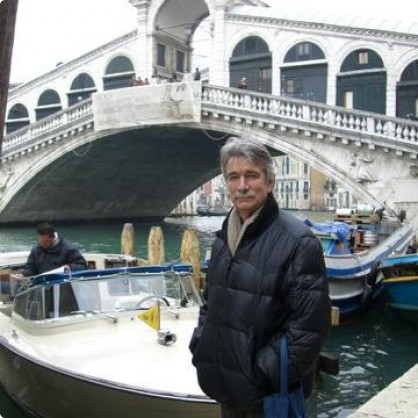Conal Atkins,
from New Zealand,
Headteacher in Germany, Luxembourg, Italy and Vietnam.

Can you briefly explain your international teaching experience – countries/schools/subjects/dates?
During my married life I have moved 10 times including seven different countries.
What inspired you to try teaching internationally?
I married a Dutch national and in an unguarded moment promised to try and get a position a little closer to her home. A search notice from Düsseldorf was sent to my school in Wellington, which I applied for. I went to the interview and got the job. From that point on I really was committed to international education – I always thought that the next move would be back to NZ but apart from a 18 month appointment in Wellington as principal at Haitaitai School – which was a fantastic year and a half, the lure of the international scene kept me way.
What was the most significant professional difference, working in an international school compared to teaching in your home country?
Initially many of my NZ colleagues always asked when I was coming home to get a “real” job. But the reality was that International schools) pose huge professional and personal challenges to the leadership. Having NZ training was a huge plus in terms of coming to terms with the international curriculum – especially the International Baccalaureate Primary Years Programme. This is an inquiry driven, concept based framework which is extremely child centred. Many of the requirements for inquiry learning will be very familiar to NZ teachers – the terminology may differ but the principles will be familiar.
What were the benefits to you professionally as a result of teaching in international schools?
I suspect that teaching in a hugely language and cultural diverse environment. In many classes there would be only two or three mother tongue English speaking students. In a graduating class (Year 12) at Vienna International School for example, of 115 students I believe that only four students were mother tongue English. Fifty-two mother tongue languages were taught in a school, which, from memory, there were over ninety nationalities.
Was there any negative impact for you professionally as a result of teaching in international schools?
Not while I was working on the international school circuit. Professionally I was exposed to all manner of initiatives and leading professional speakers whether they were curriculum or in the area of school management. Continuing Professional Development (CPD) is critical to most International School who aspire to excellence. The budget is usually generous and, for example the International Baccalaurean Organisation (IBO) mandates that schools that are authorized to run one of its three programmes must provide professional development for teachers. I had numerous opportunities to attend conferences and workshops all over the world.
Did you return to teach in your home country and if so, how easy was it for you to achieve this?
I have just, after 18 years working in international schools. I believe that I have something to offer. Moving between systems I have found that good teaching and learning/leadership skills transcend curriculum knowledge.
How did working internationally impact you personally?
Working internationally gave me a different perspective of schools and the teaching and learning process especially as it related to students for whom English was not their first language. As Head of School/Principal it made me very aware of the cultural boundaries that I had to be aware of and sympathetic to. My listening skills increased enormously! For my two boys I believe it was a life enriching experience. They have picked up a variety of languages along the way, including Dutch, French, German and (one of them) Italian. The IBO has a Learner Profile that lists the attributes that held important for international or internationally minded students.
What was your favourite country to work in and why?
Hard to choose. Vienna would be my favourite. A city built for an Empire – a great city to bring up teenagers and the opportunities for personal enrichment through a kaleidoscope of music, art, history and winter sports. Vietnam, for its exoticness and the quiet courtesy of its people and the surprises that would greet you every day, and Bologna (Italy) for its beauty, and the passion of its people for all that is beautiful whether it be food, clothes, cars, architecture
What skills do you think a teacher who has taught internationally has that teachers who remain in their home country don’t manage to acquire?
I really think that the skills of the teachers are pretty similar. Good practioineers are recognizable the world over. The grass is not greener – it’s just different! NZ teachers are highly valued not only for the quality of their teaching but also there “lets get stuck in” and “give everything a go” attitude. NZ teachers usually make great ambassadors and represent NZ well while working overseas. I have never been so nationalistic as when I am living away from NZ and I suspect it’s the same for all people living away from home.
What advice would you offer to teachers who are considering teaching internationally?
Be a risk taker but be one prudently!! Always apply through a recognized recruiting agency or if applying directly to the school, check to see if it holds some type of accredited status. There are several agencies that provide school accreditation – the Council of International Schools (www.cois.org) being just one that insists that member schools meet rigorous standards for good practice both inside and outside the classroom. Working for an International Baccalaureate Organistaion school (www.ibo.org) is another guarantee that a school has met or is meeting strict standards related to the delivery of the curriculum.
Back to Case Studies
 Mathematics Teacher
Mathematics Teacher Computer Science Teacher
Computer Science Teacher Mathematics Teacher
Mathematics Teacher Business & Economics Teacher
Business & Economics Teacher Science (Chemistry) Teacher
Science (Chemistry) Teacher